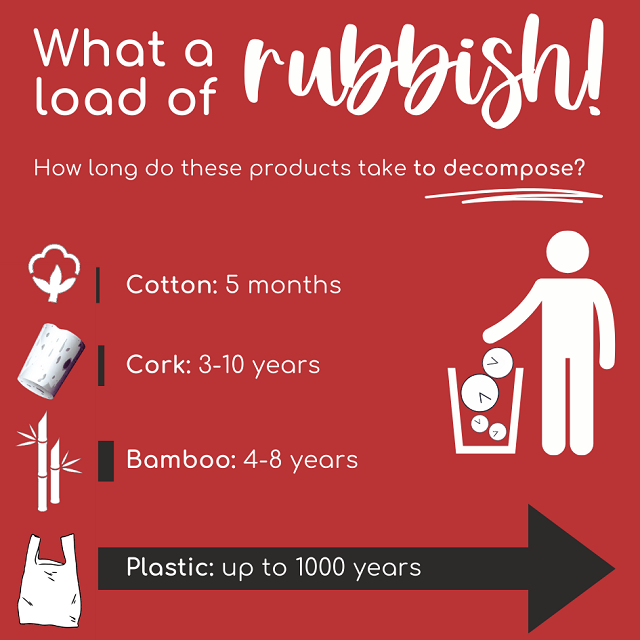
How long does promotional merchandise take to decompose?
When we discard something, we often never give it a second thought. Pop it in the bin and crack on… but, like a sour taste or a bad smell, rubbish lingers for a lot longer.
In fact, when it comes to thicker plastic or metal items, such as robust bags or USB pens, it can take up to 1,000 years for them to fully decompose. Of course, this depends on a variety of environmental factors, such as heat, exposure to sunlight, humidity, etc – but however finely you split the hairs, that’s a long time.
Despite governments sometimes rowing back on environmental commitments, more and more people are turning to sustainable alternatives to plastic to protect the environment. What’s more, it’s a great way to visibly demonstrate a willingness to embrace corporate social responsibility.
So, where do you start? Surprisingly, at the end.
The end of a product’s lifecycle is only the beginning
With plastic bags being almost weightless and durable, it’s easy to understand their appeal – but once you bin a bag, the material can take anywhere from 500 to 1,000 years to decompose. Yup, you read that right – centuries!
Worse than that, plastic actually gets more dangerous as it decomposes because it falls apart into millions of micro or nano plastic particles which are very hard to filter out of sewage, meaning they’ll end up in watercourses to cause serious harm to wildlife. In fact, plastics are even being discovered in human beings now, having leached into the food chain through fish and other marine wildlife. Yikes!
Now, on the other hand, we have eco-conscious products, such as those made of a combination of bamboo, cork and cotton. These materials take only a fraction of that time, typically decomposing in as little as three years (or five months if composted).
That’s approximately 99.7% faster, with no microplastics produced.
The global impact of waste: why going green is vital
Plastic, with its unyielding nature, has wreaked havoc on our environment for far too long. It’s not just a matter of unsightly litter – plastic pollution poses a grave threat to marine life, ecosystems, and the balance of our natural world.
Enter sustainable products, made of materials like cotton or cork. For now, let’s focus on bamboo – the unsung hero of going green.
Bamboo grows like a weed, maturing in just a few years and requiring minimal resources. It doesn’t need pesticides, and it can even help prevent soil erosion. Choosing bamboo-based promotional merchandise means supporting a renewable resource that won’t leave a toxic trail.
Going green doesn’t subtract from your style
Now, let’s talk aesthetics. Plastic may have dominated the market for years, but it’s about as stylish as a neon tracksuit from the ’80s. It’s time to let go of the plastic nostalgia and embrace the modern, and eco-friendly allure of greener alternatives like bamboo.
Bamboo is (quite literally) a natural style icon, with an undeniably warm, earthy charm – and, unlike plastic, it actually has a texture that feels good in your hands. Whether it’s a bamboo-based notebook, drinkware, or a pen, it adds a touch of clean, underrated simplicity to your life.
Cork blimey! Sustainable merch is surprisingly versatile
Sustainable materials aren’t just a retroactive addition to your marketing merch – they’re the whole hog.
Materials like bamboo or cork can be moulded and shaped into a wide variety of promotional items, from phone chargers to bluetooth speakers and even solar-powered power banks. Its versatility knows no bounds. Plus, it’s naturally antibacterial, making it perfect for portable items and officeware.
When it comes to sourcing costs for your next round of promotional merchandise, whether it’s for an event, a dedicated campaign or even an overdue revamp, take a moment to consider the cost beyond the invoice.
Going green is surprisingly cheap and, unlike plastic, it won’t cost us the Earth…